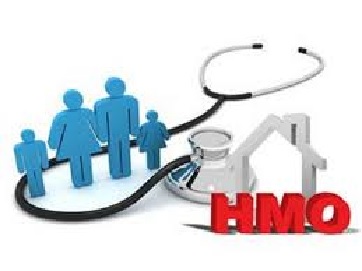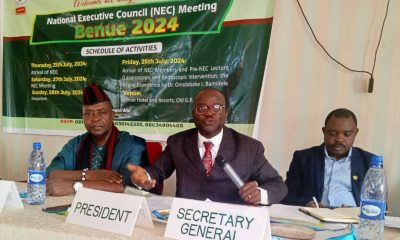Health
Minister Reads the Riot Act to Health Maintenance Organisations

By Laide Akinboade, Abuja
Angry at the poor performance of Health Maintenance Organisations (HMOs) in Nigeria, the Federal Government has said it would no longer tolerate the situation,
The Minister of Health, Dr.
Osagie Ehanire, stated this at Strategic Stakeholder’s engagement with HMOS, organized by National Health Insurance Scheme(NHIS), in Abuja. He said with on-going reforms at the agency, the HMOs must review their operations because this would help them to be relevant and reputable in the new NHIS.The Minister who was represented at the occasion by Director of Hospital services, Dr.
Omale Ahmadu, said, “Report reaching me indicate that an overwhelming percentage of enrolees and health care providers have expressed grave concerns over the performance of HMOs with areas of the concerns including, but not limited to, non-remittance of payments to healthcare providers, poor customer service delivery and inaccessibility to enrolees at critical moments of need.“The collective results of these and many other cases of service failure in the industry are poor service delivery, poor quality of care and a worrisome reputation damage for the Scheme”.
The Minister while declaring open the meeting stressed, “let it be noted today, ladies and gentlemen, that these anomalies are no longer acceptable, because this government is determined to get it right with NHIS, in view of its status as a strategic tool for effective and efficient healthcare delivery system in the country.
“I therefore have no doubts that the HMOs will key into the reforms to rebrand NHIS, by frankly addressing internal reforms within and among themselves”.
Ehanire said based on the ongoing reforms at the agency, he called on all stakeholders to take full advantage of the reforms in NHIS, to engage in frank conversations around the issues that have clogged the wheels of NHIS in the past.
“I wish to repeat myself by saying that all stakeholders of the National Health Insurance Scheme are expected to take advantage of the reform mood of the regulatory body, to critically examine themselves and their operations. This is the only way to remain relevant and reputable in the new NHIS we are building”, he said.
In his speech, the Executive Secretary of NHIS, Professor Mohammed Nasir Sambo, said it was imperative to achieve the key objectives of the agency.
“If we don’t achieve the main objectives of NHIS posterity will judge us. President Muhammadu Buhari is in a hurry to see the success of the health insurance scheme in Nigeria. So it is imperative for all stakeholders in this health insurance scheme to be committed in making it successful”,.
Former President, Resident Doctors of Nigeria, Dr. Kayode Obembe, in his goodwill message accused the GMOs of not following the stipulated laws established by the scheme, “We have very good guidelines but people are not following it. We must obey the rules and regulations, that is how we can make progress.
And whenever we go to them and tell them, this is what the law says, they don’t follow it. We need to have more legislation on the scheme”.
He lamented the health insurance scheme poor coverage in the rural areas, “The goal is Universal Health Coverage, UHC, and it can only be achieved by community based health insurance scheme”.
Health
Akume Urges Nigerians to End Silence, Stigma Around Breast Cancer

The Secretary to the Government of the Federation (SGF), Sen. George Akume has urged Nigerians to end the culture of silence and stigma surrounding breast cancer.
Akume made the call at the weekend in Abuja at the launch of the Mariam-Atswandeh Cancer Support Foundation (MACSF) and a Breast Cancer Awareness Symposium.
The event, with the theme ‘From Awareness to Action: Building Resilient Communities Against Cancer,’ highlighted the need for early detection and community engagement.
Represented by Francis Ikyenge, Director in the SGF’s office, Akume said awareness and education were key to reducing breast cancer cases and deaths.
“We must break the culture of silence and stigma.
Regular self-examinations, screenings and open conversations can save lives,” he said.He added that survivors and patients required not only medical care but also emotional, financial and social support.
Akume noted that the Federal Government, through the Ministry of Health and Social Welfare, prioritised cancer prevention, early detection and treatment.
“We are expanding screening programmes, improving radiotherapy and chemotherapy access, and working with partners to reduce patients’ financial burdens,” he said.
He stressed that partnerships with organisations such as MACSF, civil society, faith-based groups and the private sector were essential to making progress.
The SGF commended the foundation for blending awareness, advocacy and direct support in line with the government’s vision of a healthier population.
Minister of State for Health, Dr Iziaq Salako, represented by Dr Uche Nwokwu, National Coordinator, National Cancer Control Programme, urged screening organisations to provide follow-up care for diagnosed patients.
He warned that some patients die not from cancer itself, but from the psychological trauma that follows a diagnosis.
WHO Team Lead for Disease Prevention and Control, Dr. Mya Ngon, said the MACS Foundation’s establishment showed growing community resolve against breast cancer.
She added that public awareness and early detection were vital to ensuring no woman was left behind due to lack of access or information.
The Imo governor’s wife, Chioma Uzodimma, represented by Mrs Adaora Iwuanyanwu, said the foundation’s launch was timely and impactful.
“Awareness alone is not enough; we must act with urgency, compassion and collaboration,” she said.
She was represented by Mrs Adaora Iwuanyanwu, wife of the deputy speaker of the Imo house of assembly.
Uzodimma, who chairs First Ladies Against Cancer (FLAC), pledged to work with the foundation to expand screening and reduce stigma.
Convener of the foundation, Mariam Salami, a breast cancer survivor, encouraged patients to seek help and not isolate themselves.
“Cancer does not have the final word. Early detection saves lives, and no one should face cancer alone,” she said.
Salami said the foundation conducts outreach in hospitals, schools and markets to promote early detection and break cultural barriers.
According to GLOBOCAN 2022, Nigeria recorded 32,278 new breast cancer cases and 16,332 deaths, while Africa had over 198,000 new cases and 91,000 deaths.
Globally, breast cancer accounted for about 2.3 million new cases and 666,000 deaths, representing nearly 24 per cent of all female cancers.
October is commemorated globally as Breast Cancer Awareness Month.
| ReplyReply allForwardAdd reaction |
Health
Zamfara Mobilizes Stakeholders for Measles-Rubella, Polio Vaccination Exercise

The Zamfara Government says it is engaging various stakeholders to ensure the success of the forthcoming integrated Polio and Mesles-Rubella vaccination exercise that will commence on Monday.
They include partners such as the United Nations Children Fund (UNICEF) and the World Health Organization (WHO), religious and traditional leaders, among several others.
The Executive Secretary, State Primary Health Care Board, Dr.
Yakubu Hussaini, disclosed this in Gusau on Saturday at the Strategic Media Dialogue with journalists, social media influencers and U-Reporters.The media dialogue focused on the integrated campaigns for measles-rubella and polio vaccination campaign.
The executive secretary said, “We work hand in hand with UNICEF, WHO and other development partners to ensure the success of the exercise in the state.
“The state government has engaged various stakeholders including traditional and religious leaders, community leaders and health workers among others,” he added.
Yakubu said that over 1200 teams of health workers comprising injectors and recorders had been mobilised to carry out the exercise in the 10, 000 settlements across the 147 wards of the 14 local government areas of the state.
“We engaged religious leaders to mobilise and educate members of the public on the importance of the vaccination campaign.
“All arrangements have been concluded for this campaign that will cover all the children in the state.
“We have strong partnership with traditional rulers across the state through the state Council of Chiefs to ensure mass mobilisation at the grassroots for the success of the exercise.
“Our Imams used Friday prayers’ sermons to educate the members of the general public on the importance of the vaccines for the safety of our children,” he explained.
Yakubu called on the members of the public, especially the parents, to take advantage of the vaccination to protect their children against diseases.
He reiterated the state government’s commitment to ensure the successful conduct of the campaign.
Also speaking, Dr Murtala Salahudeen, the incident Manager, Polio Emergency Operations Centre in the state, said the vaccination exercise was expected to last for 10 days, with two a two-day mop-up exercise between October 16 and 17.
Salahudeen said that children from nine months to 14 years were to be administered with measles and rubella vaccine while children from birth to months would be receiving oral vaccines against polio.
Health
Africa’s Largest Health Campaign: FG targets 106m children

By Laide Akinboade, Abuja
The Federal Government (FG),at the weekend said it has concluded arrangement to vaccinate about 106 million children with measles-rubella, children from 9 months old to 14 years old in Nigeria, will benefits from this campaign.
The Health campaign will commence in October 6, 2025, and will be Africa’s largest campaign, that would introduce the measles-rubella vaccine into Nigeria’s routine immunization schedule.
Executive Director of the National Primary Health Care Development Agency (NPHCDA), Dr.
Muyi Aina, represented by the Director of Advocacy and Communication, Dr. Landa Aliyu Mohammed, disclosed this at a media orientation in Abuja.He said Rubella burden in Nigeria is under documented due to limited surveillance seroprevalence studies indicates, high levels of susceptibility in women of child bearing age.
Rubella is a present problem and causes birth defect in unborn children of infected mothers .And Rubella is often mistaken for measles.
Hence the campaign, that is a landmark initiative under the Renewed Hope Agenda, designed to protect millions of children from preventable diseases.
“Nigeria is preparing for a health campaign starting in October 2025. It is going to be a model of all campaigns the largest in the history of Africa. This campaign will also signal the introduction of the measles-rubella vaccine into Nigeria’s routine immunization,” Aina said.
The campaign will integrate several life-saving vaccines, including routine immunization for children aged 0–23 months, measles-rubella vaccine for children aged 9 months–14 years, HPV vaccine for adolescent girls, and polio vaccine for children aged 0–59 months.
Aina cautioned against misinformation, which he described as one of the biggest threats to vaccine rollouts. “We are not saying the media propagate rumors, but you are indispensable partners in countering misinformation. Your role is to provide accurate information on the benefits of vaccination, as you have done in the past,” he told journalists.
Shaikh Kabir, UNICEF Health Manager for Immunization, described the exercise as one of the most ambitious public health interventions in Nigeria’s history.
“This is a historic opportunity for Nigerian children. All children aged 9 to 14 years will receive the measles-rubella vaccine to shield them from these killer diseases, while under-five children will also receive polio vaccines,” Kabir said.
He explained that the campaign will be rolled out in phases between October 2025 and February 2026, targeting multiple diseases simultaneously, including neglected tropical diseases. Kabir urged the media to drive public demand for vaccines, saying, “Your role is paramount in building awareness, countering misinformation, and strengthening community trust.”
Also, Dr. Frank Obi, Non-Polio SIAs Consultant with AFENET Nigeria, assured parents of the safety of the new measles-rubella vaccine. He explained that it is a weakened form of the virus that cannot cause illness but prepares the body to fight off future infections.
“When the real virus shows up, the child’s immune system is already armed and ready to fight back,” he said.
While some children may experience mild side effects such as fever or rash, Obi stressed that these were rare and temporary. “Every vaccination team is fully equipped to manage any adverse events, no matter how minor,” he added.
On disease surveillance, Dr. Baffa Ibrahim, AFENET’s Vaccine Preventable Diseases Surveillance Consultant, raised concerns about under-reporting of rubella in Nigeria due to gaps in laboratory testing.
“Over 60 percent of suspected cases are managed clinically without testing, and rubella is hidden under measles surveillance,” he said.
He warned that the lack of data also affects understanding of congenital rubella syndrome (CRS), a severe birth defect when pregnant women contract rubella. “The introduction of the MR vaccine is therefore critical, as it will protect girls of childbearing age and prevent CRS,” he added.
Chima Nwankwo, Coordinator of Communications and Advocacy at the Nigerian Red Cross Society, described immunization as one of the greatest public health achievements of modern times.
“Immunization is a lifelong investment for children. It prevents needless illnesses, reduces disease burden, and increases life expectancy,” he said.
Nwankwo urged the media to highlight real-life community experiences to inspire trust, stressing: “The media sets the agenda. If you capture parents’ experiences and show how vaccination is saving lives, others will follow.”
Director of Program IVAC/WAVA, Mrs. Goodness Hardly, appealed to journalists to take ownership of the campaign.
“Journalists and broadcasters are not just conveyors of information; they are influencers of public perception. By lending their voices, they will be saving millions of children’s lives,” she said.
She added that measles and rubella are highly contagious and can cause pneumonia, blindness, brain damage, and even death if children are not immunized.
Earlier, Dr. Nana Sandah-Abubakar, Director of Community Health Services at NPHCDA, said collaboration was essential for success.
“Health is everybody’s business. Having the right information is the first step to taking the right actions and correcting any misinformation that might occur,” she said.
She urged journalists to spread accurate information and mobilize parents: “The awareness that this activity is taking place will guarantee we reach the right targets and encourage participation.”
The integrated campaign, backed by development partners and civil society, is expected to strengthen Nigeria’s health system and ensure no eligible child is left behind.





























